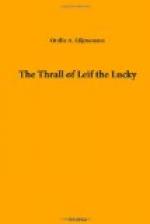“If it is not your intention to come back and profit by this discovery, chief, I must tell you that we will not willingly return to the ship. Certainly not until we have secured at least one bear apiece. We are free men, Leif Ericsson, and it is not to our minds to be led altogether by the—”
Whether or not he had meant to say “nose,” no one ever knew. At that moment the chief wheeled and looked at him, with a glance so different from Biorn Herjulfsson’s mild gaze that the word stuck in the fellow’s throat, and instinctively he leaped backward.
Leif turned from him disdainfully, and addressed the men of his old crew. “Ye are free men,” he said; “but I am the chief to whom, of your own free wills, you have sworn allegiance on the edge of your swords. Do you think it improves your honor that a stranger should dare to insult your chosen leader in your presence?”
“No!” bellowed Valbrand, in a voice of thunder.
And Lodin shook his wounded arm at the mutineer. “If my hand could close over a sword, I would split you open with it,” he cried.
The other men’s slumbering pride awoke. Loyalty seldom took more than cat-naps in those days, in spite of all the hard work that was put upon her.
“Duck him!”—“Souse him!”—“Dip him in the ocean!” they shouted. And so energetically that the ringleader, cursing the fickleness of rebels, found it all at once advisable to whip out his sword and fall into a posture of defence.
But again Leif’s hand was stretched forth.
“Let him be,” he said. “He is a stranger among us, and your own words are responsible for his mistake. Let him be, and show your loyalty to your leader by carrying out his orders with no more unseemly delay.”
They obeyed him silently, if reluctantly; and it was not long before those who had remained on ship-board were thrown into a second fever of envious excitement.
They were not pleasant, however, the days that followed. In the flesh of those who had missed the sport, the bear-fight was as a rankling thorn. The watches, during which a northeast gale kept them scudding through empty seas with little to do and much time to gossip, were golden hours for the growth of the serpent of discontent. Though the creature did not dare to strike again, its hiss could be heard in the distance, and the gleam of its fangs showed in dark corners. If Leif had had Biorn’s bad fortune, to begin at the wrong end of his journey, so that a barren Helluland was the climax that now lay before him, the hidden snake might have swelled, like Thora Borga Hiort’s serpent-pet, into a devastating dragon.
Was it not Leif’s luck that the land which was revealed to them, on the third morning, should be as much fairer than their vaunted Markland as that spot was pleasanter than Greenland’s wastes?—a land where, as the old books tell, vines grew wild upon the hills, and wheat upon the plains; where the rivers teemed with fish, and the thickets rustled with game, and the islands were covered with innumerable wild fowl; where even the dew upon the grass was honey-sweet!




